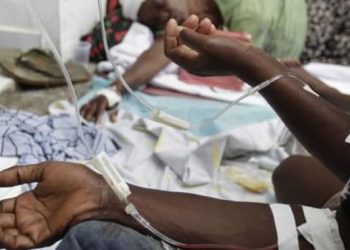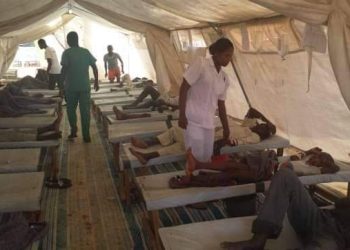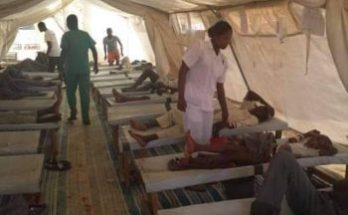The federal government Monday said states and local governments should scale up environmental health surveillance in places where food and drinks are sold nationwide.
It listed the places to include markets, garages, schools, restaurants, stadia, religious and sporting events venues.
A statement in Abuja quoted the Minister of State for Environment, Dr Iziaq Salako, as giving the directive as part of measures to stem the tide of cholera in various parts of the country.
Salako urged all commissioners for environment and the local government chairpersons to support environmental health officers across the country to step up sanitation and hygiene activities through enhanced community-led total sanitation.

He said” “It is also to strengthen collaboration with the health authorities and other stakeholders in line with the one health approach of the federal government.”
The minister also stated that arrangements had been concluded to support most affected states with chlorine solution or tablets, water and food testing resources to avert further transmission across the country.
According to him, a recent situation report from the Nigeria Centre for Disease Control (NCDC) indicated a total number of 1,159 suspected cases, 65 confirmed cases and 30 deaths across 30 States.
Worst hit, according to the statement, are Bayelsa, Lagos, Zamfara, Abia, Bauchi, Cross River, Ebonyi, Delta and Katsina, all of whom had contributed 90 per cent of cases.
The statement said: “The ministry has been actively involved through the Department of Pollution Control and Environmental Health Council of Nigeria (EHCON) in activities to curtail further transmission of the deadly disease.
“The ministry has been involved through water and food testing to identified sources of infection, environmental sanitation campaigns and household water chlorination.”

While identifying cholera as a poor sanitation and hygiene-driven disease, he said it’s also a consequence of an acute diarrhoea infection caused by ingestion of unwholesome food or water contaminated with the bacterium vibrio cholerae.
The minister noted that the disease remained a global threat to public health, affecting both children and adults and could lead to death if untreated promptly, describing it “as an extremely virulent disease that takes the period of 12 hours and five days for its symptoms to manifest.”
“The common early symptoms are frequent watery stool that is usually milky white in colour, nausea and vomiting.
“Cholera outbreak is a seasonal public health event in Nigeria, occurring annually mostly during the rainy season and often in areas with poor sanitation and hygiene practices.
“Extreme climate events like flooding are also contributing in multiple ways to drive the outbreak of the disease.
“The World Health Organisation (WHO) has confirmed the global resurgence of cases of cholera classifying the current outbreak as “grade three public health emergency”, requiring maximal WHO system wide response.
“Nigeria is one of the 14 countries in Africa where the resurgence is being experienced,” it further added.
While tasking the people to be more vigilant and imbibe good sanitation and hygiene practices at home and in their workplace, he called on all and sundry to prioritise preventive measures such as keeping their environment clean always and disposing of waste properly at designated places.
“Ensure the use of clean and safe water. Water from suspicious sources should be well boiled or treated by adding one pack of chlorine solution to 100 parts.
“Avoid locally prepared drinks like kunu, zobo, fura da nono, koko, fruit juice among others except it is certain that the preparation was done in a hygienic and safe manner.
“Wash hands regularly with soap under running water, especially after using the toilet, cleaning a child who has gone to the toilet, before preparing food, before and after eating, and after playing with animals, ” he said. (NAN)
Meanwhile, the outbreak has claimed 53 lives as of Monday, according to the Director General (DG) of the NCDC, Jide Idris.
Addressing journalists in Abuja, Idris said the 53 deaths stemmed from 1,528 suspected cases across 107 local government areas in 31 states.
He noted that the case fatality rate of 3.5% since the beginning of the year had placed Nigeria at a high-risk level (Level 3).
The National Cholera Multi-Sectoral Emergency Operations Centre (EOC) has, therefore, been activated to ensure immediate and coordinated actions from the agency to address the situation.




